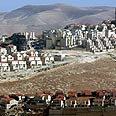
Jewish settlement (archives)
צילום: AFP
Palestinians boycott Israeli settlement goods
Economic minister says, 'Consuming settlements' products is wrong, nationally, economically and politically.' Israeli Foreign Ministry: Move counterproductive, will only hurt peace prospects
The Palestinians on Tuesday announced a boycott of Israeli products made in the West Bank, stepping up their campaign against Israeli settlements.
Economics Minister Hassan Abu Libdeh said the Western-backed Palestinian government already has confiscated $1 million worth of products, including foods, cosmetics and hardware, and the goal is to eliminate all settlement-made goods from Palestinian store shelves next year.
"Consuming settlements' products is wrong, nationally, economically, politically, and must stop right away," Abu Libdeh told a news conference.
The Palestinians have long objected to Israeli settlements in the West Bank and east Jerusalem, captured areas the Palestinians claim for a future independent state.
But they have stepped up their criticism since Israeli Prime Minister Benjamin Netanyahu took office in March. Palestinian President Mahmoud Abbas refuses to resume peace talks, which broke down a year ago, unless Israel halts all settlement construction.
Netanyahu, a traditional ally of the settlers, has imposed a 10-month slowdown on West Bank settlement construction in hopes of muting US criticism and luring the Palestinians back to the negotiating table. The order, which forbids construction of new homes, has enraged the settlers, who have blocked inspectors from entering their communities to enforce the ban.
But the Palestinians dismiss the move as insincere because it excludes east Jerusalem and 3,000 homes already being built in the West Bank. Some 300,000 Israelis live in the West Bank, in addition to 180,000 Jewish Israelis in east Jerusalem.
Israeli Foreign Ministry spokesman Yigal Palmor said the Palestinian boycott was counterproductive and would only damage peace prospects.
"I don't think by concentrating their efforts on boycotts they will achieve any of the political goals, if these still include reaching a peace agreement with Israel," Palmor said.
Carrying out the boycott will be a challenge since the Palestinian economy relies heavily on Israeli manufacturers for many basic goods.










